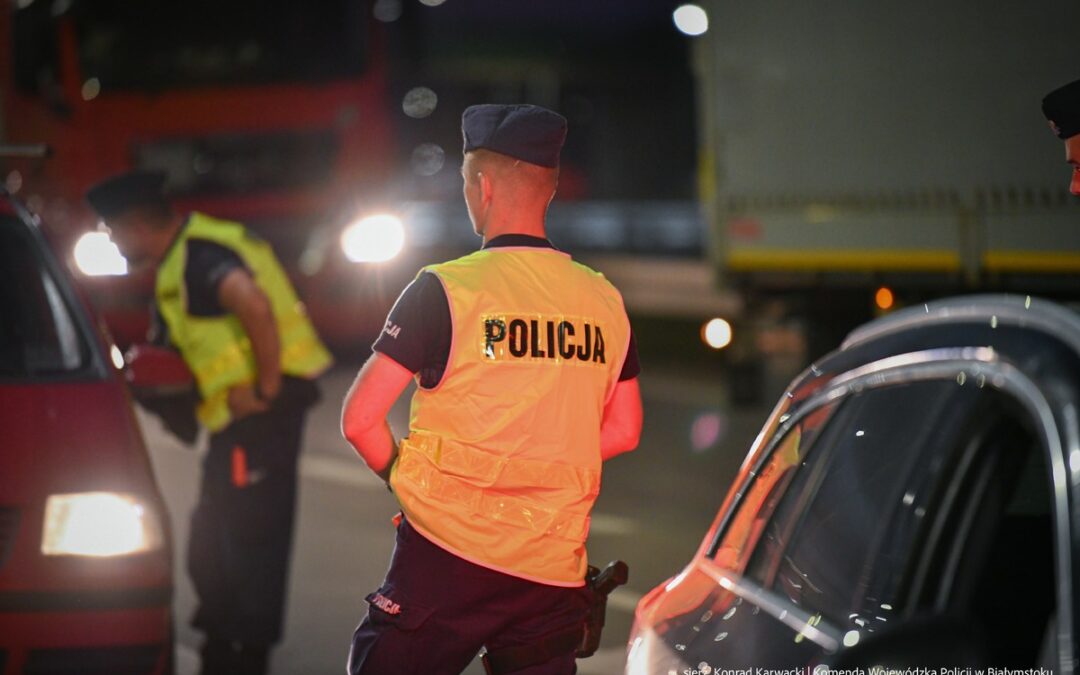Keep our news free from ads and paywalls by making a donation to support our work!

Notes from Poland is run by a small editorial team and is published by an independent, non-profit foundation that is funded through donations from our readers. We cannot do what we do without your support.
Poland has decided to extend the controls that it introduced one month ago on its borders with Germany and Lithuania for a further two months. Interior Minister Marcin Kierwiński says that the measures have “clearly been effective” in their aim of reducing illegal migration.
At a press conference on Sunday morning, Kierwiński announced that Poland has notified the European Union that the border controls, which were due to expire on 5 August, will be extended until 4 October under a government regulation issued on Friday.
❗Szef #MSWiA @MKierwinski – zdecydowaliśmy o przedłużeniu tymczasowych kontroli o kolejne 60 dni na granicach niemieckiej i litewskiej.
🟢 W #MSWiA odbyła się odprawa pod przewodnictwem ministra @MKierwinski z udziałem wojewodów oraz kierownictwa służb odpowiedzialnych za… pic.twitter.com/9ytibddhZC
— MSWiA 🇵🇱 (@MSWiA_GOV_PL) August 3, 2025
Normally, as members of the Schengen free-movement zone, there are no border checks between Germany, Poland and Lithuania. However, countries within Schengen are permitted to reintroduce controls in emergency situations if they are temporary and “a last resort measure”.
In 2023, Germany introduced controls on its borders with Poland and the Czech Republic in an effort to clamp down on illegal migration. The following year, it extended those measures to all of its borders.
At the start of July, Polish Prime Minister Donald Tusk announced that Poland would introduce checks on its own border with Germany. He had been facing growing public pressure and opposition criticism over Germany’s policy of sending back to Poland thousands of migrants who had tried to enter illegally.
On the night between 6 and 7 July, Poland introduced controls on its borders with both Germany and Lithuania, the latter of which had become a pathway for migrants who irregularly enter Latvia and Lithuania from Belarus before heading westwards through Poland.
Kierwiński revealed today that, since the measures went into place, almost half a million people have been checked at the borders: around 280,000 coming from Germany and almost 215,000 entering from Lithuania.
Speaking alongside him, Robert Bagan, commander of the Polish border guard, said that 185 foreigners had been denied entry to Poland as a result of the controls – 124 entering from Germany and 61 from Lithuania – mainly due to not having the requisite documents authorising them to cross.
“These controls are clearly yielding results,” said Kierwiński. “These actions are effective and conducted with the full understanding of our European partners…as they also serve the security interests of our neighbours.”
He added that a decision on whether to continue the border controls after 4 October would be made in September based on data from the border.
In the first week since restoring controls on its borders with Germany and Lithuania to prevent irregular migration, Poland has checked over 100,000 people seeking to cross, 60 of whom were refused entry https://t.co/9maL3bgvmv
— Notes from Poland 🇵🇱 (@notesfrompoland) July 14, 2025
Deputy interior minister Maciej Duszczyk noted that what has been happening in the region “is not a normal migration crisis” but one engineered “by countries hostile to the European Union”.
Since 2021, Belarus has been encouraging and assisting tens of thousands of migrants – mainly from the Middle East, Asia and Africa – to cross into the EU over its borders with Poland, Lithuania and Latvia. Russia is also accused of supporting those efforts.
In response, Poland’s government has introduced tough new measures, including banning asylum claims for migrants who enter from Belarus, tightening the visa system, and strengthening physical and electronic barriers on the Belarus border.
Thousands have joined anti-immigration marches organised by the far-right Confederation party in dozens of Polish cities.
"We don't want Poland sharing the fate of western Europe," said the organisers. "The state is failing, so citizens are taking action" https://t.co/a6J8usjgML
— Notes from Poland 🇵🇱 (@notesfrompoland) July 19, 2025

Notes from Poland is run by a small editorial team and published by an independent, non-profit foundation that is funded through donations from our readers. We cannot do what we do without your support.
Main image credit: Policja Podlaska (under CC BY-NC-ND 3.0 PL)

Daniel Tilles is editor-in-chief of Notes from Poland. He has written on Polish affairs for a wide range of publications, including Foreign Policy, POLITICO Europe, EUobserver and Dziennik Gazeta Prawna.



















